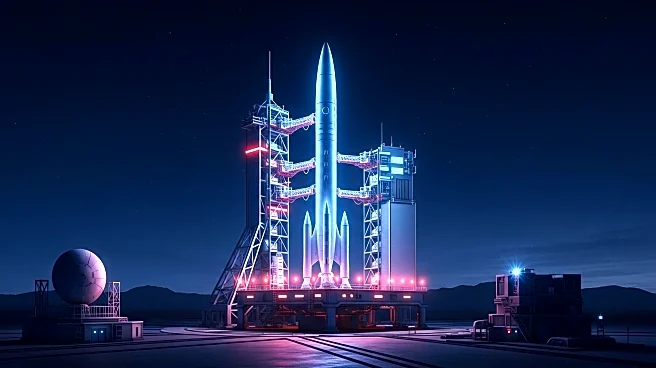What's Happening?
Rocket Lab has introduced its new launch complex at the Virginia Space Authority’s Mid-Atlantic Regional Spaceport in Wallops Island, Virginia, as it prepares for the first flight of its Neutron rocket. The facility, named Launch Complex 3, is designed to support testing, launch, and return missions for the reusable Neutron rocket, which is the largest vehicle to fly from the spaceport. Rocket Lab CEO Peter Beck emphasized the importance of having a world-class launch facility to support the next-generation rocket, which aims to meet the growing demand for space missions from both commercial and military sectors. The Neutron rocket is positioned as a competitor to SpaceX in the medium-lift market, with plans to support the Defense Department's national security missions. Rocket Lab has been included in the U.S. Space Force's National Security Space Launch program, allowing it to offer Neutron for military missions. The company plans to conduct the first launch by the end of the year, with subsequent launches scheduled in the following years.
Why It's Important?
The unveiling of Rocket Lab's new launch pad and the upcoming Neutron rocket launch is significant for the U.S. space industry, as it introduces a new competitor in the medium-lift market currently dominated by SpaceX. This development could alleviate the bottleneck in demand for space missions, providing more options for commercial and military customers. Rocket Lab's inclusion in the U.S. Space Force's National Security Space Launch program highlights its potential role in supporting national security missions, which are crucial for the country's defense capabilities. The expansion of Rocket Lab's operations at Wallops Island also aligns with Virginia's strategy to become a major player in the space industry, potentially boosting local economic growth and technological advancements.
What's Next?
Rocket Lab is focused on preparing for Neutron's first flight, with key testing and hardware integration scheduled in the coming months. The company aims to conduct static-fire testing to validate the rocket's engine performance and ensure readiness for launch. Following the initial launch, Rocket Lab plans to increase its launch cadence, with three launches next year and five the following year, eventually reaching one flight per month. The success of Neutron's launch and operations at Wallops Island could lead to further infrastructure investments, including deep-water ports, to support future human spaceflight missions.
Beyond the Headlines
The introduction of Rocket Lab's Neutron rocket and its new launch complex could have long-term implications for the U.S. space industry, potentially driving innovation and competition. The focus on reusable rockets aligns with broader industry trends towards sustainability and cost-efficiency in space missions. Additionally, Rocket Lab's expansion in Virginia may contribute to the state's vision of becoming a leading space industry hub, fostering collaboration between government, industry, and academia.









